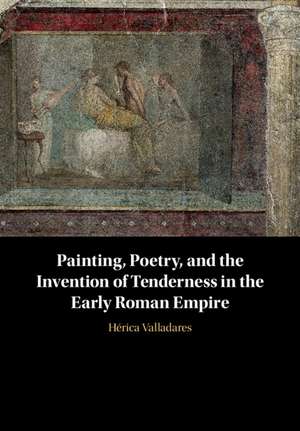Painting, Poetry, and the Invention of Tenderness in the Early Roman Empire
Autor Hérica Valladaresen Limba Engleză Hardback – 16 dec 2020
Preț: 701.94 lei
Preț vechi: 788.69 lei
-11% Nou
Puncte Express: 1053
Preț estimativ în valută:
134.33€ • 138.77$ • 111.80£
134.33€ • 138.77$ • 111.80£
Carte tipărită la comandă
Livrare economică 25 martie-08 aprilie
Preluare comenzi: 021 569.72.76
Specificații
ISBN-13: 9781108835411
ISBN-10: 1108835414
Pagini: 266
Dimensiuni: 182 x 259 x 19 mm
Greutate: 0.73 kg
Editura: Cambridge University Press
Colecția Cambridge University Press
Locul publicării:New York, United States
ISBN-10: 1108835414
Pagini: 266
Dimensiuni: 182 x 259 x 19 mm
Greutate: 0.73 kg
Editura: Cambridge University Press
Colecția Cambridge University Press
Locul publicării:New York, United States
Cuprins
List of figures; List of plates; Acknowledgments; Introduction. On Roman tenderness; 1. The tenderness of lovers; 2. The tenderness of monsters; 3. The tender interior; Epilogue. Tenderness transformed; Bibliography; Index.
Recenzii
'Valladares's book nicely complicates the Rome of our popular imagination. The Romans have become so tied to imperialism and brutality that 'Roman tenderness' sounds like an oxymoron. But tenderness and brutality are not always easily disentangled Roman imperialism in fact enabled this shift toward the personal. Roman private leisure, after all, relied upon the enslavement of others and the cultural appropriation of Greek art and literature. Tenderness and brutality stand juxtaposed. By focusing on the softer side of the Romans, Valladares shines a welcome light on their complexity.' Stephanie McCarter, Hyperallergic
'In this lucidly written, highly engaging book, Valladares traces a Roman evolution of what she perceives to have been an unprecedented kind of desire. This desire looks nothing like the sexually explicit scenes found on Athenian vases or on the walls of Pompeian brothels, imagery that has shocked modern sensibilities and attracted much scholarly attention over the years. Valladares' subject is not sex, but love; not eroticism, but tenderness. Few would describe the Romans, a people whose foundation stories centre on rape, as tender; even fewer would claim that tenderness was a Roman invention. The book's bold premise is backed up by close, comparative and contextual readings of carefully chosen case studies from Latin love elegy and Roman and Campanian wall painting. Valladares situates her findings within the history of scholarship on ancient sexuality, but they should also be seen as an invaluable contribution to the study of ancient emotions.' Charlie Pemberton, Bryn Mawr Classical Review
'In this lucidly written, highly engaging book, Valladares traces a Roman evolution of what she perceives to have been an unprecedented kind of desire. This desire looks nothing like the sexually explicit scenes found on Athenian vases or on the walls of Pompeian brothels, imagery that has shocked modern sensibilities and attracted much scholarly attention over the years. Valladares' subject is not sex, but love; not eroticism, but tenderness. Few would describe the Romans, a people whose foundation stories centre on rape, as tender; even fewer would claim that tenderness was a Roman invention. The book's bold premise is backed up by close, comparative and contextual readings of carefully chosen case studies from Latin love elegy and Roman and Campanian wall painting. Valladares situates her findings within the history of scholarship on ancient sexuality, but they should also be seen as an invaluable contribution to the study of ancient emotions.' Charlie Pemberton, Bryn Mawr Classical Review
Notă biografică
Descriere
This book connects the emergence of Latin love elegy and a new, tender style in Roman wall painting.
